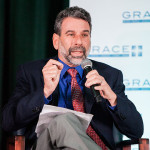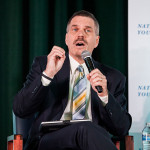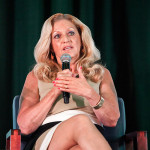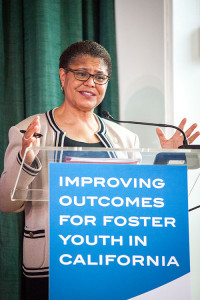
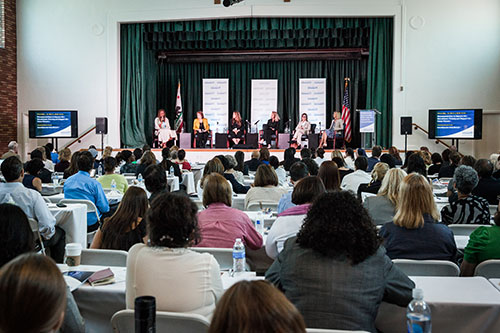
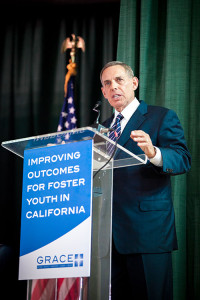
The goal of “Improving Outcomes for Foster Youth in California”, the conference GRACE co-convened last summer with the National Foster Youth Institute (NFYI) in coordination with Rep. Karen Bass was to identify and discuss recommendations to improve the child welfare system in California, reach consensus among stakeholders, and implement key recommendations.
Each of the recommendations made at the Conference were thoughtful, well informed and important. But in order to be the most effective, GRACE, working with the NFYI and Rep. Karen Bass, needed to prioritize implementation of the recommendations that will have the most immediate impact.
In order to determine key recommendations, GRACE engaged in a series of discussions, interviews and further research. Following that process, GRACE convened a small work group of key leaders to discuss the following potential priorities:
- Reduce caseloads for social workers
- Full and immediate assessments of children upon removal from the home with recommendations for placement, treatment and immediate services
- Address disproportionality
- Increase financial support for relative caregivers
- Additional funding for early intervention and support for at-risk families
- Improve training of foster parents
- Improve recruitment and retention of foster parents
Although the group acknowledged that each of the recommendations is crucial, there was general consensus on the following priorities:
- Social worker caseloads have to be reduced immediately. The protections for children and thoughtful decision-making owed to children and their families in this most excruciating exercise of government responsibility and authority cannot be applied unless social workers have a reasonably manageable caseload.
- Early intervention and support for at-risk families has been shown to help keep families together, reducing the number of children having to endure the trauma of separation from their families and thus the number of foster parent and foster homes that are needed. The group also emphasized that the early intervention process should utilize the Differential Response framework, which allows the least invasive response to a neglect or abuse allegation while still protecting the child.
Both recommendations will require an increase in state and perhaps federal funding.
There was also agreement on two other issues.
First, all aspects of the foster care system, specifically including the training and selection of social workers and the delivery of services through early intervention and support, should be culturally sensitive and appropriate.
Second, foster parent recruitment is crucial. It was felt, however, that it could most effectively be accomplished through local efforts such as community groups and churches. We may want to encourage private efforts to respond to this need.
- Congresswoman Karen Bass
- Conway Collis, President and CEO, GRACE
- Jill Duerr Berrick, Ph.D., Co-Director, Center for Child and Youth Policy, UC Berkeley
- Ken Berrick, Founder, CEO, Seneca Center for Children and Families
- Cheryl Grills, Ph.D., Associate Dean, Loyola Marymount; Co-Director, Los Angeles Blue Ribbon Commission on Foster Care
- David Green, Secretary and Treasurer, SEIU 721
- Steve Gunther, MSW, President and Executive Director, Maryvale
- Sam Herod, CASA LA
- Kathryn Icenhower, Ph.D., LCSW, CEO, SHIELDS for Families
- Sara Larios Mitchell, Ph.D., CEO, StarVista
- Hope Morrison, Former Foster Youth
- Hon. Mike Nash, Presiding Judge, Los Angeles County Juvenile Court
- Courtney Powers, Vice President and General Counsel
- Sandra Sanchez, Vice President and COO, GRACE
- Martine Singer, President and CEO, Para Los Niños
- Wendy Smith, Ph.D., LCSW, Clinical Associate Professor, School of Social Work, USC
- Janis Spire, President and CEO, Alliance for Children’s Rights
- Harriett Zaretsky, CASA LA



